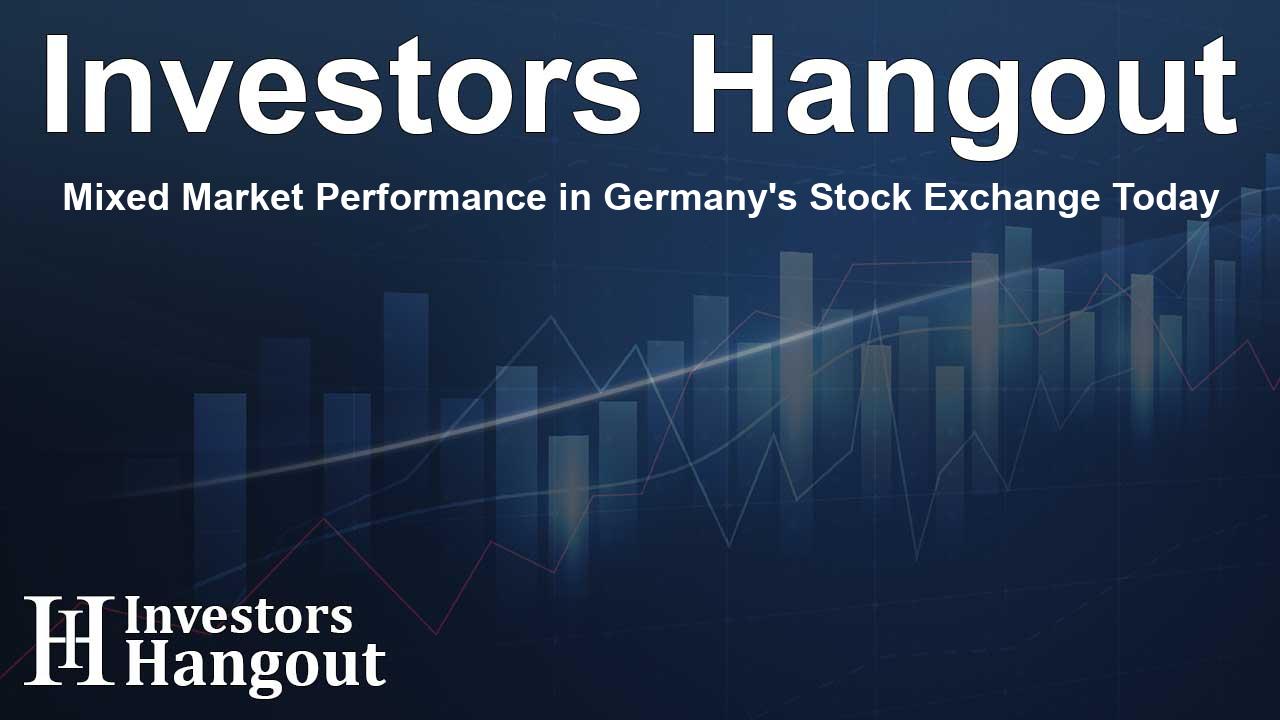Mixed Market Performance in Germany's Stock Exchange Today

Understanding Germany's Stock Market Trends
Germany's stock market exhibited a mixed performance, showcasing a blend of activity among various sectors. The end of the trading day revealed some interesting shifts, particularly with indices such as the DAX taking a slight downturn while others showed resilience and growth. Despite a slight decline of 0.18% in the DAX, notable performances were observed across other indices, like the MDAX, which climbed by 0.61% and the TecDAX, which saw a gain of 0.41%.
Sectors Influencing the Market
Within the broad landscape of the stock market, certain sectors emerged as key players. The Food & Beverages, Technology, and Utilities sectors reported gains, providing a positive undercurrent to the market performance. Conversely, the Construction, Financial Services, and Basic Resources sectors faced challenges, contributing to the mixed market sentiment.
Key Index Performances
Upon closing in Frankfurt, the DAX index, which is a focal point for investors, recorded a slight decline, while the MDAX and TecDAX reflected a more optimistic trend. These movements are indicative of the complexities characterizing the current financial landscape.
Top Performers and Their Impact
Among the stars of the trading session, Rheinmetall AG led the way on the DAX, posting a commendable increase of 1.31%. Following closely was Heidelberg Materials AG with a rise of 0.96%. Their performances contributed to a semblance of stability in an otherwise fluctuating market.
Notable Declines to Watch
Simultaneously, certain companies faced declines, with Volkswagen AG experiencing a notable drop of 1.98%. Other major players, including Porsche Automobil Holding SE and MTU Aero Engines, also fell, reflecting the challenges within the automotive and aerospace industries.
MDAX Highlights
The MDAX’s performance offered a contrasting narrative, with Aixtron SE showcasing significant growth of 7.81%. Others like Hella KGaA and Gerresheimer AG also contributed positively, signaling strong support for these companies amidst the overall market fluctuations.
Influences on Market Fluctuations
As the trading session progressed, various factors came into play, influencing equities and commodities alike. The DAX volatility index, which tracks the market's implied volatility, slightly decreased, hinting at reduced trader uncertainty. Such metrics are essential for discerning potential future movements in the stock market.
Commodity and Currency Dynamics
The commodities market also saw shifts, with gold futures increasing, suggesting a growing interest in safe-haven assets during uncertain times. Meanwhile, crude oil prices presented a mixed bag with slight declines in both February and March contracts, indicating ongoing variability in energy markets.
Currency Trends
The currency market remained relatively stable, with the EUR/USD pair demonstrating minor changes. The US Dollar Index Futures experienced a slight drop, presenting opportunities and challenges for international trade and investments.
Conclusion: Navigating Complexity in the Market
Overall, the dynamics within Germany's stock market present a compelling picture. Investors are keenly observing the varying performances across sectors and indices, attempting to navigate the complexities of the current economic climate. With some companies thriving while others struggle, understanding these patterns can help in making informed investment decisions.
Frequently Asked Questions
What caused the mixed performance in Germany's stock market?
The mixed performance was influenced by gains in specific sectors like Food & Beverages and Technology, contrasted by losses in Construction and Financial Services.
Which index experienced the most significant decline?
The DAX index faced the most notable decline, dropping 0.18% at the close.
Who were the top performers in the DAX?
The top performers included Rheinmetall AG, Heidelberg Materials AG, and Siemens Energy AG, showing resilience despite broader market challenges.
How did the MDAX perform in comparison to the DAX?
The MDAX showed a more positive trend, climbing 0.61%, contrasting with the DAX's decline.
What impacts do fluctuations in the DAX index have on investors?
Fluctuations in the DAX index can significantly affect investor sentiment and decisions, influencing the broader market movements and investment strategies.
About Investors Hangout
Investors Hangout is a leading online stock forum for financial discussion and learning, offering a wide range of free tools and resources. It draws in traders of all levels, who exchange market knowledge, investigate trading tactics, and keep an eye on industry developments in real time. Featuring financial articles, stock message boards, quotes, charts, company profiles, and live news updates. Through cooperative learning and a wealth of informational resources, it helps users from novices creating their first portfolios to experts honing their techniques. Join Investors Hangout today: https://investorshangout.com/
Disclaimer: The content of this article is solely for general informational purposes only; it does not represent legal, financial, or investment advice. Investors Hangout does not offer financial advice; the author is not a licensed financial advisor. Consult a qualified advisor before making any financial or investment decisions based on this article. The author's interpretation of publicly available data shapes the opinions presented here; as a result, they should not be taken as advice to purchase, sell, or hold any securities mentioned or any other investments. The author does not guarantee the accuracy, completeness, or timeliness of any material, providing it "as is." Information and market conditions may change; past performance is not indicative of future outcomes. If any of the material offered here is inaccurate, please contact us for corrections.